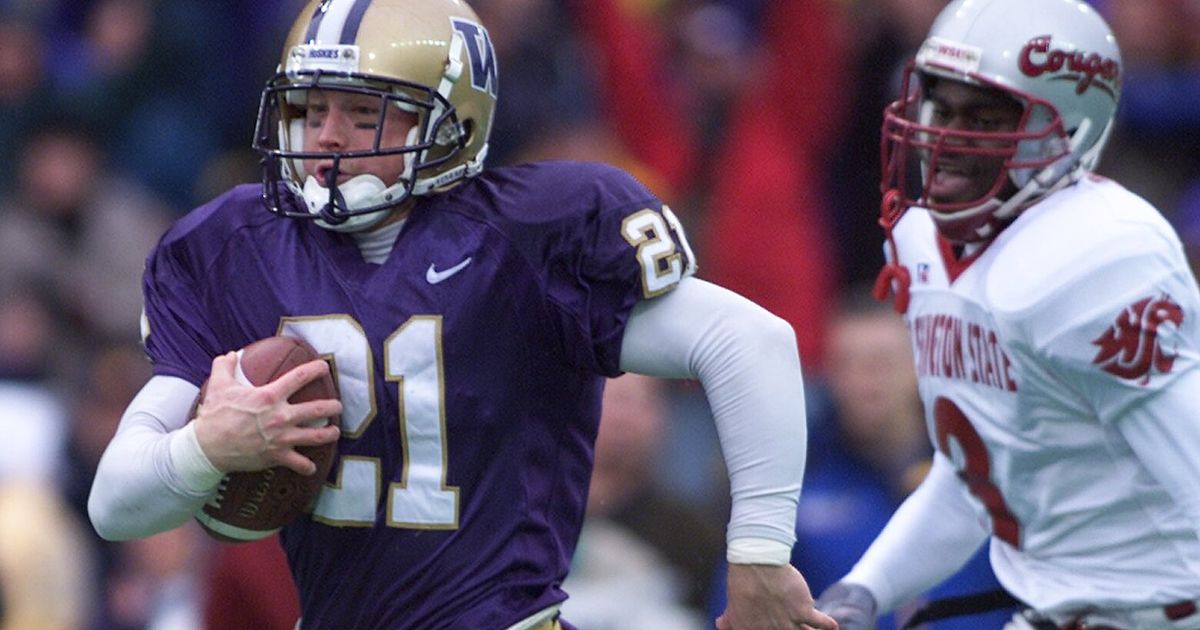
Joe Jarzynka, who went from little-known walk-on to one of the most popular University of Washington football players of the 1990s — or any era — has died, according to reports and social-media messages of friends, teammates and school officials.
According to a report from myclallamcounty.com, a man identified as Jarzynka was found dead Sunday morning along the Sol Duc River in the Olympic Peninsula.
According to the report, Clallam County Sheriff’s Deputies were dispatched around 10 a.m. Sunday to a report that there was a man deceased on a river bank outside of Forks. According to the report, the reporting party advised that a male was obviously deceased and was wearing a tan fishing vest.
The report stated that deputies responded with medics and a swift-water rescue team was deployed. They found a single-person pontoon boat stuck in a log jam about a mile from where the deceased male was located, according to the report.
The man was identified as a 45-year-old Tacoma resident, Joseph D. Jarzynka. The report stated his family said Jarzynka came to Forks to go fishing and brought with him a single-person pontoon boat.
“Husky Nation, today we lost a legend, Joe Jarzynka,” tweeted Cam Cleeland, a former teammate of Jarzynka’s and currently an analyst for the school’s gameday radio broadcasts. “RIP #21 No Fair Catching brother.’’
Indeed, as his official UW bio stated, the 5-foot-7, 175-pound Jarzynka was a “fearless man on special teams’’ who “refuses to fair catch any punt.’’
Jarzynka walked on to the UW football team in 1995 out of Gig Harbor High School, telling The Seattle Times in 1998 that his only scholarship offer had come from Eastern Washington University.
Though he was the MVP of the Pierce County League as a senior at Gig Harbor and was second-team all-state, his size scared off bigger schools.
He told the Times in 1998 that he decided to walk on at UW and not take the scholarship offer to Eastern in part because “football isn’t the only interest in my life.” And he relished the non-football-playing aspects of his life, including teaching himself to play guitar.
Not that Jarzynka didn’t fully throw himself into football.
After a redshirt year in 1995, he earned a role the following season as a kickoff and punt returner and gradually became used as a receiver.
The flowing locks of hair that tailed out the back of his helmet, as well as a gregarious personality, helped earn him widespread popularity that included a fan club — one of its mottos was “Joe, Joe, he’s our guy, give him the ball and he will fly” — and a contest from the UW Daily newspaper to give him a nickname, Mo’ Joe.
His greatest season came as a junior in 1998 when he was a first team All-Pac-10 selection as an all-purpose player, not just for his return abilities but also for his kicking.
When kickers Randy Jones and Nick Lentz quit the team, Jarzynka — who had also been a star soccer player in high school — volunteered to take on the placekicking duties.
Jarzynka not only filled in as the kicker but made 6 of 8 field goals that season, including a 44-yarder that helped key a 16-9 win in the Apple Cup in Pullman that assured UW of a bowl game and a 22nd consecutive nonlosing season.
His greatest game came that same season against Cal at Husky Stadium when he returned a punt 91 yards for a touchdown — famously running to the fence behind the end zone and shaking it in an attempt, he said later, to get noticed by ESPN — and set a team record with 166 punt return yards, at the time a Pac-10 record.
At the end of the season he was named as the team’s KIRO-TV/Pete Gross Player of the Year.
The following year he was part of the key play of UW’s 24-14 win over WSU in the Apple Cup when he caught a 55-yard TD pass on a trick play, the pass coming from fellow former walk-on receiver Dane Looker.
Jarzynka was wide open on the play and ran untouched into the end zone.
But a quote he gave later to reporters typified why Jarzynka so endeared himself to teammates and fans.
“That’s something we’ll always be able to talk about when we’re 80 years old,” he said. “The story could be that he threw the ball from the 1-yard line 70 yards and I had to elude three defenders to get to the end zone.”